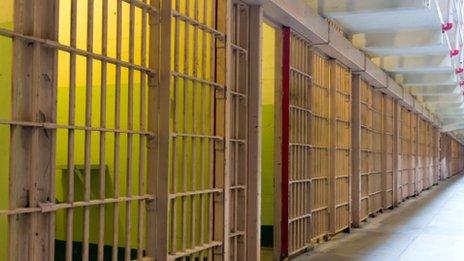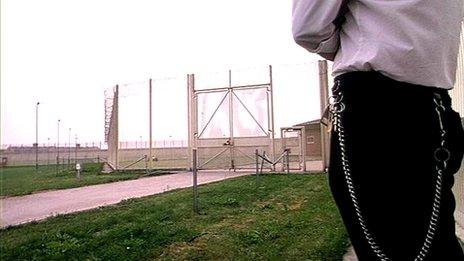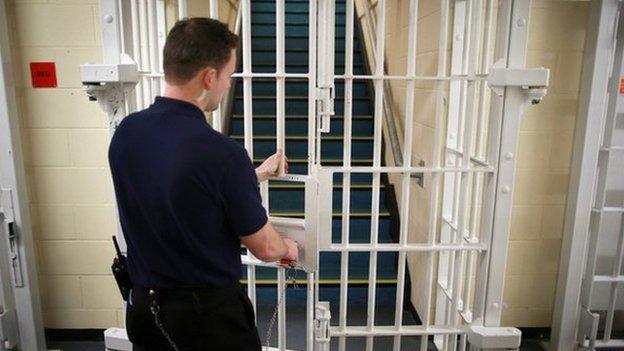Prison book restriction 'harms studying'
- Published

The report says access to books in prison helps studying and rehabilitation
Restrictions on the number of books prisoners in England and Wales can have in their cells may inhibit inmates' ability to learn, a charity warns.
Inmates are allowed 12 books in their cell but new privileges regulations, introduced last year, stopped them receiving parcels, including books.
The Prisoners' Education Trust (PET) is urging ministers to improve access to books and materials to assist learning.
Prisons minister Andrew Selous said he was "committed to improving education".
The Ministry of Justice said prisoners had access to libraries and could ask to have books ordered in.
Distance learners
In a report, Brain Cells: Listening to Prisoner Learners, the PET said the restriction on the number of books prisoners could have in their cells was "inadvertently impacting on higher level and distance learners who need a variety of sometimes specialist books".
The report went on: "We recommend this is reviewed urgently to ensure that it does not inadvertently inhibit learning, and encourage prison governors to use their discretion in the meantime.
"This is especially important as currently staff shortages are making it increasingly difficult for prisoners to access prison libraries."
The trust said the restriction was affecting prisoners' "ability to study and hence impacting on their rehabilitation and risk of reoffending".
Equal pay
The report also called for prisoners who opt for learning instead of working in prison to be paid equally.
It cited HMP Brixton in London as an example of best practice since it revised its pay structure so that any work with a vocational based qualification is the highest paid within the prison.

Prison governors are urged to "use their discretion" over book allocations
The report draws on the findings of a survey of 343 prisoners conducted in September last year.
More than half of respondents to the PET poll (56%) said equal wages with those working would make learning easier.
It found 58% of respondents felt better access to books and materials would help them learn and 69% said learning had improved their ability to cope with prison.
The report also recommends better learning strategies for prisoners serving longer sentences and improved opportunities for those who want to progress to higher levels of study.
Better information, communications and technology (ICT) programmes with improved access to computers were also suggested.
The poll was distributed via the prison newspaper Inside Time.
The PET said it acknowledged that the sample was not representative of the prison population because completing the poll required a reasonable level of literacy and those who completed it were likely to be committed to learning, but said the research was "important" nonetheless.
'Priority'
Rod Clark, chief executive of the Prisoners' Education Trust, said there were many examples of wasted resources and missed opportunities in the state's delivery of prison education.
"We know the government values education. That is commendable and welcome, but overall, the policies are not doing what works to reduce reoffending.
"This report is published at a time when inspection reports and news coverage shows that staff cuts are making it harder for teachers and education managers, especially when the officers aren't there to escort prisoners from their cells to class.
"But education must be prioritised as it is more productive and cost-effective than leaving people to do nothing."
The MoJ said the PET survey of 343 inmates represented just 0.01% of the total prison population in England and Wales.
Mr Selous said: "We are committed to improving education across the prison estate - and this is clearly shown by the increase in prisoner participation so far this year.
"We work closely with the Department for Business, Innovation and Skills and the Skills Funding Agency to develop prisoner learning and will continue to focus on prisoners' individual needs rather than take a one-size fits all approach."
- Published7 May 2014

- Published25 March 2014
